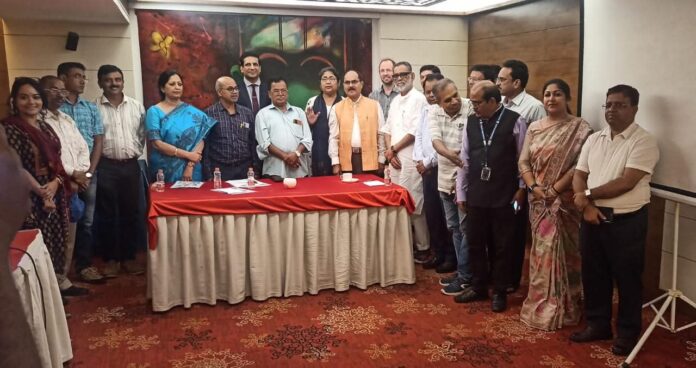Special Reporter: A State-Level Consultation Workshop on Collectivized Natural Farming was held on October 10, 2025, at the Hotel Sonnet, Salt Lake, Kolkata, jointly organized by the University of Birmingham (UK) and the Centre for Development of Human Initiatives (CDHI), Jalpaiguri. The event brought together eminent policymakers, scientists, and development professionals to deliberate on strategies for promoting ecologically sound and economically viable farming systems for small and marginal farmers in West Bengal.
Mr. Purnendu Basu, former Hon’ble Minister-in-Charge, Department of Agriculture, Government of West Bengal, in his address, emphasized the need to restore biodiversity and soil vitality that once characterized Bengal’s farming heritage. He stressed that natural farming offers a pathway to rejuvenate soil health, reduce dependency on costly external inputs, and ensure ecological balance in diverse agroecosystems.
Ms. Dola Sen, Hon’ble Member of Parliament, Government of India, highlighted that safe, chemical-free, and nutritious food should be accessible to every citizen. She underlined the crucial role of women and rural youth in scaling up natural and collective farming initiatives, advocating for the empowerment of self-help groups and cooperatives as key agents of transformation.
Delivering the Keynote Address, Dr. Ashok Kumar Patra, Vice-Chancellor, Bidhan Chandra Krishi Viswavidyalaya (BCKV), observed that while the Green Revolution ensured India’s food self-sufficiency, it also resulted in soil degradation, environmental pollution, and reduced factor productivity. He emphasized that a scientific understanding of nutrient dynamics and soil fertility management under natural farming systems is essential for long-term sustainability. Dr. Patra reaffirmed BCKV’s commitment to advancing research, innovation, and farmer-centric extension on natural and integrated farming systems, inviting the University of Birmingham and CDHI to develop collaborative projects for region-specific models in West Bengal.
Dr. Fraser Sugden (University of Birmingham) presented successful women-led collective farming models from West Bengal, Bihar, and Nepal, demonstrating how pooling of land, labour, and capital enhances productivity, market access, and irrigation efficiency. Professor Manabendra Ray (BCKV) elaborated on climate-resilient natural farming practices that improve soil carbon sequestration, reduce greenhouse gas emissions, and enhance drought resilience in districts such as Jhargram, Purulia, Bankura, and Paschim Burdwan of West Bengal.
Many excellent presentations and success stories were shared by experts and practitioners, illustrating the potential of natural farming in India. The workshop concluded with a shared commitment to integrate ecological wisdom with collective action, paving the way for a resilient, inclusive, and climate-smart agricultural future where natural farming holds promising opportunities for West Bengal.




